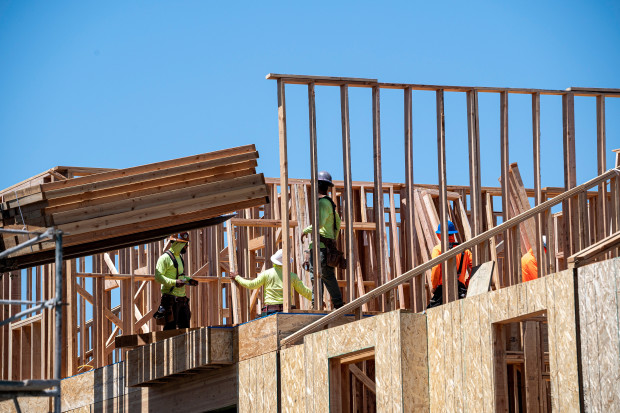
Goldman Sachs investment strategists see U.S. stocks outperforming those overseas, as the U.S. economy grows faster than its peers.
“Our recommendation is to stay invested and overweight the U.S.,” Sharmin Mossavar-Rahmani, chief investment officer of Goldman’s Wealth Management division, said in a panel discussion Thursday.
Goldman’s chief economist Jan Hatzius estimates only a 20% chance of U.S. recession in the next 12 months, compared to a two-thirds consensus in The Wall Street Journal economic survey.
“The economy continues to look quite resilient,” he said. “Layoffs are still very low. There’s also impressive growth in real personal disposal income -- 4% year-to-year growth.”
The Federal Reserve’s interest rate increases of the past 16 months haven’t hurt the economy much. “That can most easily be seen in the housing sector where the slowdown of late 2022 has waned,” Hatzius said. He predicts GDP growth of 1.5% to 2% this year.
As for inflation, he noted that consumer price inflation has dropped from about 9% last June to 3% this June. And there’s “good reason to expect ongoing price deceleration,” given downward pressure on used-car, rent and labor costs.
U.S. Market Preeminence
All this makes U.S. markets “preeminent,” Hatzius said. China suffers from weakness in the property market, infrastructure investment and exports, along with an aging workforce and limited fiscal easing by the government, Mossavar-Rahmani said.
“For the longer-term, we’re cautious on Chinese growth,” Hatzius said. He’s optimistic that Europe can achieve a soft landing, but economic growth will be slower there -- 0.5% -- than in the U.S. where he forecasts 1.5% to 2%. “The European Central has more work to do” in terms of policy tightening.
Looking at U.S. corporate earnings, Goldman expects a 1%-2% decrease for the second quarter, compared to analysts’ consensus forecast of a drop in the high single digits, Mossavar-Rahmani said.
“There’s uncertainty driven by the energy sector,” she said. “Underlying earnings power is stronger than that.” Goldman expects earnings to rise 4%-6% for the full year, compared to the consensus estimate of 0.5%.
Mossavar-Rahmani said she is frequently asked about Indian stocks. The decoupling of foreign companies from China “benefits India at the margins,” she said. “But that’s already priced in. The Indian market trades at a 33% premium to the U.S.”
Hatzius On Artificial Intelligence
Hatzius also addressed the topic of artificial intelligence. It’s difficult to forecast the impact of AI short- and long-term, but obviously, “the effects could be very sizable,” he said.
“It’s not that generative AI will replace truly creative work, but rather a lot of not-so creative work. That includes filling out forms and building routine models.”
AI might replace 25% of current hours worked in 10 to 15 years, Hatzius said. “If that’s true, it will greatly enhance labor productivity, adding 1.5 percentage points of productivity growth a year.” That’s comparable to the personal computer and Internet revolutions of the 1990s, he said.
“The uncertainty is we don’t know how powerful AI will be and how well companies will incorporate it,” Hatzius said. Another big question is what will workers do with the 10%-20% of worktime they get back from AI. And for workers displaced by AI, how quickly will they be reintegrated into the workforce?







